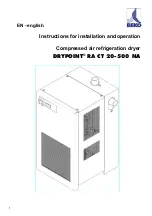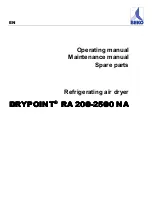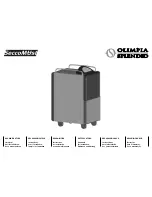
E – Sequence of Operation
OMM.E.P.AA.00
E‐
3
June
2018
Compressor(s)
Whenever the compressor operates, the evaporator is always dehumidifying and cooling the return air. The heat
removed from the air at the evaporator, as well as the heat from the compressor's action, must be rejected to one
of three heat sinks: room (premise) air, pool water (if applicable) or outdoors. The control system will direct the
heat to where it is needed based on room (air and pool water temperature) conditions:
If room air is needed to be warmed up – more heat is diverted towards reheat coil;
If pool water is needed to be warmed up – more heat is diverted towards pool heating coaxial heat exchanger
(if dehumidifier is equipped with this option).
Rest of the heat (if any) is diverted towards outdoors (outdoor fluid cooler, external heat sinks etc.)
Compressor Circuit Operation
Piping schematic for compressor circuit is shown on Pic. E.2.
Schematic shows single compressor circuit (second compressor circuit schematic is the same) and common to
both compressor circuits’ glycol cooling circuit.
Circuit operation below applies to both compressors; compressors are staged – if first compressor’s capacity is
not enough to satisfy the call, second compressor will be engaged after certain time delay.
When a demand requires the compressor to operate, the following sequence occurs:
Once blower operation, related safeties and timers are confirmed by the control system, following occurs:
o
Compressor glycol pump starts, establishing cooling glycol/water flow through the compressor fluid
circuit ‐ plate heat exchanger(s) and fluid cooling coils (reheat and/or fluid cooler or external cooling
source).
o
Pump down solenoid valve opens and once pressure stabilizes, the compressor starts.
Based on the premise air temperature, the Reheat and AC valves would adjust their opening position (open
more/close more), reducing or increasing fluid flow to and through the respective fluid coils:
Reheat and AC valves are controlled in the same manner with opposite effect: for example,
when AC valve opens 10% more, Reheat valve closes 10% more etc.
o
if more heat is required by the room air, the Reheat valve opens more, and AC valve closes more, thus
diverting more fluid to the reheat coils (heat is rejected to the premise);
o
if more cooling is required by the room air, the AC valve opens more, and Reheat valve closes more,
thus diverting more fluid to the fluid cooler (heat is rejected outdoors).
o
Outdoor fluid cooler fans are engaged only if at least some fluid is diverted towards outdoor fluid cooler
and compressor pressure is higher than pre‐set level (see
Outdoor Fluid Cooler Operation
below).
Dehumidifiers, equipped with pool water heating option, also engage the refrigeration pool water heating
solenoid valve to reject heat into the pool water, based on pool water temperature.
Once demand for the compressor’s operation is removed (respective call is satisfied), the pump down solenoid
valve closes; once the compressor suction pressure reaches the pre‐set pressure, the glycol pump and
compressor stop.
Outdoor Fluid Cooler Operation.
Based on the type of the outdoor condenser or fluid cooler fans’ type (two‐speed fans or EC‐type/modulating
fans), respective signal(s) are sent by control system to engage said fan(s): for two‐speed fans ‐ on/off signals
(switching speeds, based on compressor head pressure level), for EC‐type fans ‐ variable 0‐10VDC signal
(proportional to the compressor head pressure level). Refer to the fans’ type and wiring diagram if/when needed.
If the fluid cooler is equipped with the built‐in pump package (to establish cooling fluid flow between dehumidifier
and the fluid cooler or to serve as additional/booster pump), the said pump is also engaged along with fluid cooler
fans – pump would stay engaged while fans are engaged (regardless of the fans’ speed).














































